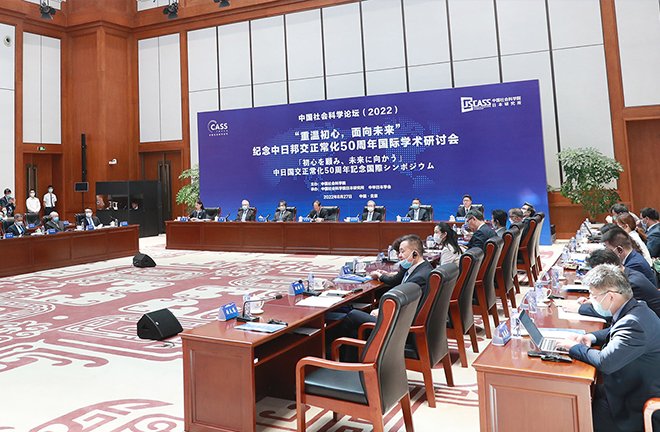Int’l symposium eyes closer China-Japan ties 50 years on

A scene from the international symposium Photo: Zhu Gaolei/CSST
On Aug. 27, the Chinese Academy of Social Sciences (CASS) held an international symposium in Beijing to commemorate the 50th anniversary of the normalization of diplomatic relations between China and Japan. Through online and offline channels, more than 100 participants from China and Japan conducted in-depth analysis of, and discussion on, the development course, status quo, and experience of various fields in China-Japan relations from historical and realistic perspectives. On this basis, they explored the future direction and paths to improve bilateral ties, contributing new ideas, methods, and plans for building China-Japan relations that fit the needs of the new era.
Addressing the forum’s opening ceremony, Liu Yandong, former vice premier of China’s State Council and president of the International Confucian Association, pointed out that with superb strategic wisdom and extraordinary political courage, the leaders of the older generation on the two sides bridged the gap between the East and the West in the Cold War, and worked together to normalize diplomatic relations, opening up a new historical chapter in China-Japan relations.
Over the past five decades, China and Japan have formed a close-knit community with a shared future amid interdependence, active cooperation, and deep integration. The results of the normalization of diplomatic relations have benefited not only people of the two nations, but also neighboring countries and even the entire international community, Liu said.
Last year, the leaders of the two countries reached an important consensus on promoting the building of China-Japan relations that fit the needs of the new era. Under this guidance, Liu urged efforts from both sides to take the 50th anniversary of the normalization of diplomatic relations as an opportunity to cement the political foundation of bilateral ties, and to maintain, consolidate, and develop the hard-won friendly situation created by the joint efforts from predecessors in the two nations and of the two peoples.
Former Japanese Prime Minister Yasuo Fukuda said that world economic development is decelerating due to the COVID-19 pandemic and the Ukraine crisis. On the occasion of the 50th anniversary of the normalization of diplomatic relations between Japan and China, in the face of the new international situation, Japan, China, and other countries around the world should cooperate in such fields as mitigating climate change, in addition to fighting the pandemic.
CASS President Shi Taifeng noted that the 2,000-year history of exchanges between China and Japan and the 50-year course of the normalized diplomatic relationship between the two countries have taught us that China and Japan both stand to gain from cooperation and lose from confrontation. Peaceful coexistence and friendly cooperation are the only correct choices for the bilateral relationship.
Shi further pointed out the necessity to focus on the fundamental and long-term interests of the two countries and peoples, carry forward the East Asian wisdom of harmony in diversity and solidarity, jointly safeguard the achievements of mutual trust since the normalization of diplomatic relations, and promote a more mature, stable, healthy, and resilient relationship between the two nations.
“CASS is willing to carry out exchanges with all walks of life in Japan as always, and make greater contributions to facilitating the building of China-Japan relations that fit the needs of the new era,” Shi said.
Chinese Ambassador to Japan Kong Xuanyou said that China-Japan relations have once again come to a crossroads, and both sides should face up to and solve prominent problems in current bilateral relations with a high sense of responsibility and mission. China and Japan should enhance cooperation momentum, activate the energy of non-governmental friendship, and give more prominence to risk management and control. The two counties need to play an active role in international and regional affairs, and jointly open up new prospects for bilateral relations in the new era, Kong said.
At present, Japan-China relations are facing many challenges, said Tarumi Hideo, Japanese Ambassador to China. At a time when bilateral exchanges are hindered, the leaders of the two countries are even more needed to provide guidance for improving Japan-China relations and strengthening cooperative relations which benefit the two peoples.
Edited by CHEN MIRONG

 PRINT
PRINT CLOSE
CLOSE